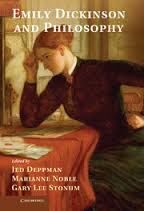Эмили Э. Дикинсон. Пока не вымерзли пруды
Коньков не слышен бег,
Пока в час хладных сумерек
Щек не коснулся снег —
До убранных полей ещё,
До ёлки Рождества
Чудо расчудесное
Посетит меня!
Бахромы б коснуться
Летнего денька, —
И живёт не дальше
Одного мостка —
Что звучит — поет во мне —
Когда я одна —
Скажи мне, платье, все в слезах,
Что надеть должна?
37
Before the ice is in the pools—
Before the skaters go,
Or any check at nightfall
Is tarnished by the snow—
Before the fields have finished,
Before the Christmas tree,
Wonder upon wonder
Will arrive to me!
What we touch the hems of
On a summer's day—
What is only walking
Just a bridge away—
That which sings so—speaks so—
When there's no one here—
Will the frock I wept in
Answer me to wear?
Emily Dickinson
Прим. переводчика:
Стихотворение написано в 1858 году, когда Эмили было 28 лет и, несомненно, говорит о Сью, т.е. о женщине, которую Эмили любила.
Оно перекликается с Библией — "Благая весть в Изложении Матфея: (9:21), когда очень больная женщина, прикоснувшись к бахроме верхнего платья Исуса, выздоровела.
Чисто по-женски, обращаясь к платью, Эмили заканчивает своё стихотворение.
Благодарна Елене Ительсон за редакцию этого перевода.
From Internet:
<<The first stanza is vaguely disquieting with its image of a cold pond before it ices over and is ready for skating parties. The "check" is sometimes written as "cheek", the difference being between a ticket (presumably for a skating party) and a face. The interesting part, however, is how the snow tarnishes it--generally snow is considered a symbol of purity, or as a lovely winter blanket. Perhaps Dickinson wants to be taken at harvest time, before the snow arrives that leaves behind dead, frozen, stubble and blooms. She waits as a jilted bride would wait in her special dress for the return of her groom--the 'wonder opon wonder' to arrive.
I wonder if this isn't going a step too far, however, The poet might simply be writing about that magical pause between late harvest and winter when the world is gold and orange, when berries and pumpkins weigh down their canes and vines. In F32 she describes the berry's plump cheek, the browning nuts, and the gay scarf and scarlet gown of the field. In that poem the poet wants to put on a trinket, whereas in this one she wants to put on a gown she wept in--perhaps weeping for the tarnishing of glorious fall with winter's deadly snow.
She may simply be writing about Sue's return to town, but somehow I find this idea lacking>>.
Стихи.ру 23 августа 2016 года
Свидетельство о публикации №116082309969
Арост 19.11.2016 00:02 • Заявить о нарушении
Лилия
Лилия Мальцева 19.11.2016 00:14 Заявить о нарушении

